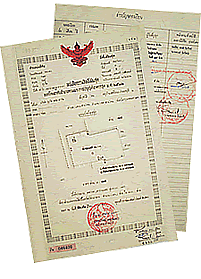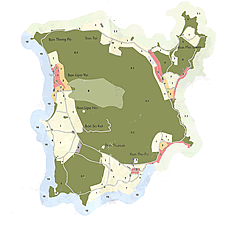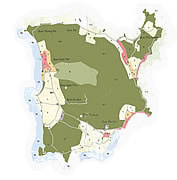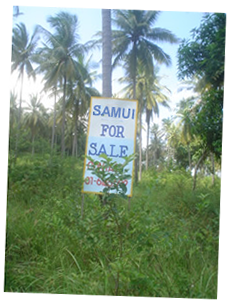Title deeds issued by the Land Department and other government departments
Land rights and land documents in Thailand
A LAND TITLE DEED issued by the relevant Thai government (land) department shows a person's rights to land (ownership if it is a Chanote title deed) and registered encumbrances such as mortgages, leases, etc. on a property. Foreigners are not allowed to own land and cannot be named as the owner of land in Thailand but they can be the holder of certain rights like lease, right of usufruct, habitation, superficies, mortgage which can be registered in their name on the title deed - read more...
CHANOTEThis is a certificate for ownership of land. A person having their name shown on the deed has the legal right to the land, and can use it as evidence to confirm the right to government authorities. The title deed has been issued by using GPS to set the area and boundaries of the land, which is a very accurate method. Any legal acts may be done immediately, as per the right of ownership.: from the land title documents issued by the Thailand Land Department only the Nor. Sor. 4 Jor or Chanote is a true land ownership title deed.
The 6 main title documents issued by the Land Department for individual use relate to temporary occupation, use and occupation, confirmed right of possession or notification of possession of land (i.e. the Sor Kor 1). In fact all the land documents issued by the Land Department, except the chanote, are still officially government land. The Nor Sor 3 title deeds are rights of confirmed possession similar to ownership rights, however are not true ownership documents.
Related: Tanslation of a land tile deed, Thailand Land Code Act
Overview of the main land titles issued by the Thailand Land Department:
Sor Kor 1 (S.K. 1) | Nor. Sor. Song (N.S. 2) | Nor. Sor. Saam (N.S. 3) | Nor. Sor. Saam Gor (N.S. 3 G.) | Nor. Sor. Saam Khor (N.S. 3 K.) | Nor. Sor. Ha (N.S. 5) | Nor Sor Si Jor (N.S.4.J) | LAND DOCUMENTS ISSUED BY OTHER DEPARTMENTS Sor. Por. Gor. 4-01 (S.P.G. 4-01) | Sor. Tor. Gor. (S.T.G.) | Por. Bor. Tor. 5 (P.B.T. 5) | Nor. Kor. 3 (N.K. 3) | Gor. Sor. Nor. 5 (G.S.N. 5)
NOTE: it is basically ONLY possible to register rights (sale, lease, usufruct, superficies, etc.) with the Land Department and obtain official building approval over land with a confirmed right of possession (the Nor.Sor.3 land titles) or full ownership title (Nor.Sor.4.Jor/ Chanote title deed). The modern land title deeds Nor Sor 3 and the Chanote issued by the Land Department should look as the document image above, but, depending on the period the document was issued the land ownership documents could vary in design, garuda color and even size. The rights associated with land titles are in more detail described further down in this page. The most secure land title offering full individual ownership in Thailand is the Chanote (officially identified as Nor.Sor.4.Jor), followed by the Nor Sor Saam Gor/ Khor which offer confirmed right of possession. The Nor.Sor.3 without extension is less interesting, mainly because of the lesser rights and survey status associated with this title.
Sor Kor Nung (1)
The S.K.1 land document is a notification form of possession of land and has little real rights associated with it. It entitles the holder to occupy and use the land (generally for farming). The person who actually occupies the land may have a better right than the person who has just a notification form. This land may be sold and transferred by inheritance. Legally the transfer process is not more than handing over the notification form and possession or use of the land from one person to another. It is not possible to register rights (sale, lease, usufruct, mortgage, etc.) over this type of land. Depending on the land’s location, this document may be upgraded to a title deed Nor. Sor. 3, Nor. Sor. 3 Gor or Nor. Sor. 4 Jor (Chanote).
The Land Department has not issued any new Sor Kor Nung documents since 1972. It is currently NOT possible any more to upgrade a Nor Sor 1 to a full title deed with the Land Department read more...
Nor Sor Song (2)
The N.S.2 is a consent letter issued by the land department to the holder. This document entitles the holder to occupy and use the land for a temporary period of time. The holder has to commence occupation and using the N.S. 2 land within 6 months and has to complete the utilization of the land within 3 years from the receipt of N.S.2. This land may not be sold or transferred except by inheritance. Depending on the land’s location, this document may be upgraded to Nor.Sor. 3, Nor.Sor. 3 Gor or Nor. Sor. 4 Jor (Chanote), however, after the upgrade the prohibition for sale or transfer is still effective and in full force.
Nor Sor Saam (3)
The N.S.3 is a title deed which shows a person's right to possess a certain plot of land, but the land borders must be confirmed with neighboring plots. There are no so called parcel points or numbered concrete posts which are hammered into the ground to mark the boundaries of the land. The name showing on the title is the person who has the right to the land and has the legal right to possess the land and use the benefit of the land as an owner (it is not actual full ownership). This right will be recognized by the law and can be used as evidence in any dispute with an ordinary person or the government. It is possible to register a sale or lease and apply and obtain approval to build on this land if building complies with relevant building regulations, zoning and or other laws (e.g. environmental protection). The owner may burden the land (mortgage, lease, etc.) and register this with the Land Department. The land may be sold subject to a 30-day public notice period.
A problem with the Nor Sor Saam title (as opposed to a Chanote or Nor Sor Saam Gor title) is that it is not true land ownership or confirmed right of possession but a right of possession over a land area without an accurate surveyed boundary which often lead to boundary disputes when transferring/selling or upgrading such land during the notice 30-day period and possible hostile possession over such land under the Civil and Commercial Code (book 4) - i.e. claims over the land by someone else not registered as the person who has the registered rights to the land.
Nor Sor Saam (3) Gor
The N.S.3.G has the same legal basis as the Nor. Sor Saam however the boundaries of the land are defined and the land is accurately surveyed in relation to neighbouring land areas (the land area parcel points are set by using an aerial survey), the right of use has been confirmed and legal acts concerning the land, such as sale, do not need to be published and it is possible to register rights against the land and subdivide the land in smaller plots.
Nor Sor Saam (3) Khor
The N.S.3.K is similar to the N.S.3 Gor however is surveyed and issued in an area which has no parcel points set by using an aerial survey. This document issued by land officer. There are no restriction for the use of the land and there is no need to publicize any legal acts, and it is possible to subdivide the land into smaller plots.
Nor Sor Si (4) Jor (Chanote)
The N.S.4.J or Chanote is a certificate of true ownership for land and the only true ownership land title deed. Land held under Chanotes are accurately surveyed and GPS plotted in relation to a national survey grid and marked by unique numbered marker posts set in the ground. Chanote titles are found in the more developed areas of Thailand. Legal acts (sale) do not have to be published. There are no general restrictions on the use and the land can be sub-divided.
Note:
- In some areas of Thailand full land deeds have been issued in a land reform programme but contain restrictions such as the right to sell the land within a period of time of issuance ownership rights (e.g. not having the right to sell or encumber the land within a period of 10 years).
- The land area stated in a Chanote title deed should be accurate, however, with the right connections it could have been manipulated. E.g. a Chanote states 3 Rai but the actual size after a private survey turns out to be 2 Rai. Land prices are usually expressed in Thai baht per Rai or for smaller plots Thai baht per Wah. The sale and purchase agreement will (when it is upgraded between the sale and transfer) include something like 'the size of the land appearing on the Chanote shall be final and the purchase price shall be adjusted pro-rata with the area appearing on the Chanote'. You simply pay for more land than you get. Irregularities in the issuing of land-right documents showed there were land-right documents for about 200,000 rai where the Samui island only has 150,000 rai (July 19 2006).
- If a squatter is in possession of land for an uninterrupted period of 10 years in case of a Chanote (section 1382) ('and have peacefully and openly possessed the property belonging to another, with the intention to be its owner he acquires ownership of it'), they can apply to the Land Office for a deed of ownership. So, if you hold land under Chanote but a squatter takes possession and you do nothing to remove that squatter from the land for 10 years, then you could lose that land to the squatter. As this is only one year in case of possession (section 1374 Civil and Commercial Code) it is not uncommon for someone else to claim possession over (part of) such land.
Nor Sor Ha (5)
The N.S. 5 is a document that verifies the right of the holder in the N.S. 5 land. If the holder has a N.S. 5 land document along with a utilization certificate it indicates that the district officer has confirmed the utilization on the land, so this NS. 5 land with the utilization certificate can be sold or transferred by registration at the land office. Without the supporting evidence in the form of a utilization certificate it indicates that the district officer has not yet confirmed the utilization of such and in this case may not be sold or transferred except by inheritance.
Land documents issued by other government departments
Sor. Por. Gor. 4-01 (S.P.G. 4-01) | Sor. Tor. Gor. (S.T.G.) | Por. Bor. Tor. 5 (P.B.T. 5) | Nor. Kor. 3 (N.K. 3) | Gor. Sor. Nor. 5 (G.S.N. 5)
Under Thai law the Land Department is the only competent authority to deal with land and registering and transferring private rights over land. Transfer of ownership of land claims (or rent/ lease) over titles issued by other government departments than the Land Department can NOT be registered with the Land Department or is restricted for transfer. The following documents are the main land documents in Thailand issued by other government departments than the Land Department:
Large areas of Thailand do not have any title documents and are government land or public land, not open for private use. Large areas are restricted for private use or are essential land claims which are not a confirmed right of use or possession. This could also be claims of use which have filed with other government departments than the Land Department.
UPGRADING It is in certain circumstances possible (based on the determination of the land by the government, the type and length of the claim and the use of the land) to upgrade untitled land, like the Tor.Bor.Ha (T.B.5), to a FULL title deed, Nor Sor 3 or Chanote. Approval is often very unlikely and easy money is made by the Thais who have been selling this type of land claims among others in Koh Pha-Ngan and Samui, to foreigners. There is generally only money to be lost with these deals as the land will not be upgrade. The possible upgrade is often only in theory. With ignorance of foreigners and the suggested huge profits many have lost their money in these scams or are still waiting for an upgrade which will likely never happen. Update: Sor Kor Nung (1) land can't be upgraded any more with the Land Department but only through a court procedure.
Sor Por Gor. 4-01 (S.P.G. 4-01) is an allotment of land from the land reformative committee. Under no circumstance may this land be bought or sold. It confers the right to occupy only and be transferred only by inheritance. It seems that the land may be used for agriculture only (update: in the news)
Sor Tor Gor (S.T.G.), is an land certificate issued only in the zone of national reserved forest. The holder of this document has the right to reside and live on the S.T.G. land. This land is prohibited for sale, however, the right of the holder to reside and live on the land can be passed on heir by inheritance. This document issued by the Thailand Forest Department.
Por Bor Tor 5 (Ha) (P.B.T. 5), is an evidence showing that the occupier of a plot of land has been issued a tax number and has paid tax for using and the benefit of the land. This evidence gives no official rights at all, but was formerly used to establish that the holder was occupying a plot of land and could apply for a Sor Kor 1 and later for a land title deed.
Bangkok Post, September 12 2005; 'Land authorities will not issue title deeds to holders of Tor Bor Ha / Sor Por Gor or Bor Por Tor land right documents on Samui island. Charoen Chanparn, of Surat Thani land office, said the office has told local leaders in all tambons on the island to survey the land plots and see which kind of land documents have been issued in their villages. ONLY holders of Sor Khor 1 and Nor Sor 3 land ownership documents would have their papers upgraded to title deeds. Suthee Thiankallaya, Land Department inspector-general, said that although the state allows land owners to convert their land into capital, no title deeds for encroached land would be issued on Samui island'
Nor Kor 3 (Saam) (N.K. 3), is a utilization certificate issued under the Act of Land Allocation for Living B.E. 2511. This document issued only for members of a self-help settlement.
Gor Sor Nor 5 (Ha) (G.S.N. 5), is a utilization certificate issued under the Act of Land Allocation for Living B.E. 2511. This document issued only for member of cooperative settlement.
Land measurments Rai, Ngan, Wah
1 Rai 4 Ngan (or 1600 Sq.m.)
1 Ngan 100 Wah (or 400 Sq.m.)
1 Wah 4 Sq.m.
1 Acre 2.5 Rai (approx.)
1 Hectare 6.25 Rai (approx.)
Metric measures are usually used in the construction and measurement of buildings.
Related:










